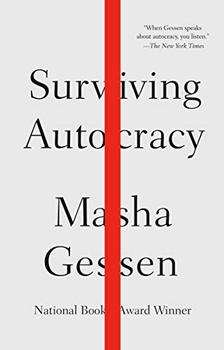Summary | Excerpt | Reviews | Beyond the book | Read-Alikes | Genres & Themes | Author Bio

How We Embraced Fear and Abandoned Democracy
by Elaine Tyler MayIn Fortress America, Elaine Tyler May presents a fascinating but alarming portrait of America's recent history and the effect of events upon its citizens. Beginning with the threats posed by the Cold War, she examines the different fears that have gripped the nation in subsequent decades—fears that are often not substantiated by the facts.
May creates a compelling argument about the impact of the nuclear threat on people's concept of safety. When the Soviet Union exploded its first atomic bomb in 1949, American policy was a "strategy of deterrence": stockpiling weapons so that no nation would dare attack. But because the "good guys," the Americans, had already dropped nuclear bombs, "there was every reason to believe that the bad guys would do the same." Fear of nuclear war and war with the Soviets inspired the period of anti-communist hysteria now known as McCarthyism. May cites a 1950 Gallup poll in which 13% of respondents said that American citizens who had committed no crime should be shot or killed if they were communists.
At the same time as the nuclear threat dominated the public consciousness (through the media, film and political campaigns), the government made it clear that it could do only so much. Americans who wanted to feel safe needed to take matters into their own hands by moving into the suburbs for space, luxury, privacy and, increasingly, security. The search for security, May argues, continued to drive Americans away from the city to escape crime and violence. In the 1960s the Civil Rights movement coincided with a growing perception among the white population that the black populace was a threat. Television media had a particular role to play here bringing "scenes of burning cities and violent crime rate into homes across the country," raising fears of disorder that were only added to by the assassinations of the Kennedy brothers and Martin Luther King. Vital civil rights advances were made, but the War on Drugs and the War on Crime in succeeding decades had the effect, May says, of creating a perception among white Americans that black Americans, particularly young males, were overwhelmingly a threat to their security—at home and on the streets.
Among many perceived threats, Fortress America examines the concept of stranger danger as it was introduced to women and children; gated communities; panic rooms; self-defense classes; the increase in the number of huge SUVs; home security systems; voter suppression and gun ownership. May puts forward a wide range of statistics emphasizing the disparity between perceived fears and actual threats. The picture she portrays of America in the late 1960s as "politically...profoundly divided," is all too familiar. Moving to the present day, May suggests that the election of Donald Trump with his "law and order" and "build-a-wall" messages is the natural—perhaps inevitable— consequence of six decades of rising anxiety.
However Fortress America provides only a one-sided view. The argument of the book is that fear of the atomic bomb, then communism, then crime and particularly the black population has, over time, caused large numbers of Americans to move to the suburbs and hide out in large houses with private pools and huge SUVs to keep themselves safe from harm. But it seems unlikely that even those who fit this profile will see themselves and their choices as fear-based. A discussion about the major impact of the financial crash of 2008 when large numbers of people lost their homes is missing as is an analysis of the subsequent Obama years. Insecurity over health insurance and the impact of The Affordable Care Act in trying to assuage at least some of that insecurity is another area that seems oddly absent. This leaves the impression that the subject of the book is not the fears of Americans as a whole, but rather those of a subset: the white, affluent American.
May occasionally sacrifices nuance especially when evaluating the contemporary landscape. Writing about the 2012 murder of Trayvon Martin for example, she describes George Zimmerman as a "white vigilante" (Zimmerman has a Peruvian mother and a white father). While Fortress America is certainly a thought-provoking and informative read, particularly about the 1950s and '60s, May seems less of an objective voice on more recent events. In the end, her suggestion that Trump "won the presidency by promising, essentially, to turn the entire country into a gated community" may amuse many readers but it will likely alienate many others.
![]() This review
first ran in the February 7, 2018
issue of BookBrowse Recommends.
This review
first ran in the February 7, 2018
issue of BookBrowse Recommends.

If you liked Fortress America, try these:

by Leah Sottile
Published 2025
An investigation of the New Age movement in America that aims to understand its appeal to women and the self-proclaimed prophetesses, like Love Has Won's Amy Carlson, who've created kingdoms for themselves within it.

by Masha Gessen
Published 2021
A bestselling, National Book Award–winning journalist's bracing elucidation of our tumultuous times.
Your guide toexceptional books
BookBrowse seeks out and recommends the best in contemporary fiction and nonfiction—books that not only engage and entertain but also deepen our understanding of ourselves and the world around us.